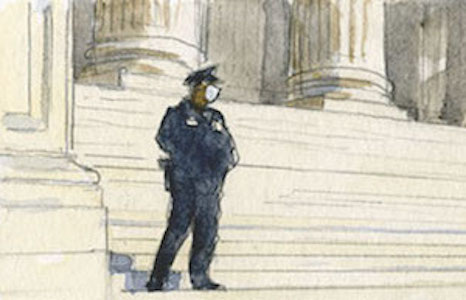Brooklyn Catholic diocese asks justices to block limits on attendance at church services

on Nov 12, 2020 at 6:46 pm

The Roman Catholic Diocese of Brooklyn asked the Supreme Court on Thursday to block limits imposed on in-person church attendance because of the coronavirus pandemic. The plea renews a dispute over restrictions on worship services while some secular businesses remain open. The Supreme Court rebuffed similar challenges over the summer, but this is the first one to come to the justices since Justice Amy Coney Barrett’s confirmation last month, and the diocese could find more success before the now more conservative court.
The order at the center of Thursday’s filing, issued by New York Gov. Andrew Cuomo (D) in October, limits in-person attendance at church services to either 10 or 25 people, depending on the number of COVID-19 cases in the areas in which a particular church is located. As a practical matter, the diocese contends, the order “effectively bars in-person worship at affected churches – a ‘devastating’ and ‘spiritually harmful’ burden on the Catholic community.” By contrast, the diocese noted, many secular businesses, including “everything from supermarkets to pet stores,” are allowed to stay open.
The diocese went to federal district court in New York, where it argued that Cuomo’s order violates the Constitution’s free exercise clause. Both the district court and the U.S. Court of Appeals for the 2nd Circuit declined to block the limits, leading to Thursday’s appeal to the Supreme Court.
Thursday’s filing followed other challenges by religious institutions to COVID-related shutdown orders and attendance limits. In May, the justices divided 5-4 in turning down a request from a San Diego-area church to issue an order that would allow it to hold Sunday services. The South Bay United Pentecostal Church had argued that the reopening plan created by California Gov. Gavin Newsom (D) and San Diego County discriminated against houses of worship by keeping the church closed while retail stores, offices, restaurants and schools were permitted to operate.
Chief Justice John Roberts joined the court’s four more liberal justices in voting to deny the church’s plea. In a statement explaining his decision, Roberts stressed that courts should normally not second-guess politicians’ decisions about questions like the one raised by the church – particularly when “local officials are actively shaping their response to changing facts on the ground.”
Four justices – Clarence Thomas, Samuel Alito, Neil Gorsuch and Brett Kavanaugh – indicated that they would have granted the church’s request. In a dissenting opinion joined by Thomas and Gorsuch, Kavanaugh argued that California had not offered a good reason for treating houses of worship differently from the businesses that are allowed to remain open.
In July, the court again divided 5-4 in denying a request from a Nevada church for an order that would have allowed it to hold in-person services on the same terms that other facilities in the state, including casinos, were allowed to operate. The church, Calvary Chapel Dayton Valley, argued that the COVID-19 shutdown order issued by the state’s Democratic governor, Steve Sisolak, discriminated against houses of worship by allowing a maximum of 50 people to attend services while allowing casinos, gyms, bars and restaurants to operate at 50% of capacity.
Thomas, Alito, Gorsuch and Kavanaugh again would have granted the church’s request. In a dissenting opinion joined by Thomas and Kavanaugh, Alito wrote that the Supreme Court’s “willingness to allow such discrimination is disappointing.” “For months now,” Alito lamented, state and local governments have “responded to the pandemic by imposing unprecedented restrictions on personal liberty, including the free exercise of religion.” And while those restrictions may have been “understandable” at the time, Alito concluded, government officials do not have free rein “to disregard the Constitution for as long as the medical problem persists.”
The court has changed significantly in one respect since issuing its order in the Nevada case: Eight weeks after that order, Justice Ruth Bader Ginsburg died of complications from pancreatic cancer. She was succeeded by the more conservative Barrett, who is more likely to be receptive to the church’s argument than her predecessor.
The diocese’s request went first to Justice Stephen Breyer, who is currently fielding emergency appeals from the 2nd Circuit. Shortly after the diocese submitted its request Thursday, Breyer ordered the state to file a response by Wednesday, Nov. 18, at 2 p.m. EST.
This article was originally published at Howe on the Court.


